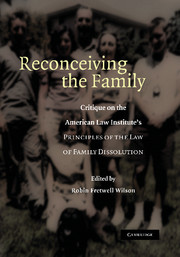 Reconceiving the Family
Reconceiving the Family Book contents
- Frontmatter
- Contents
- Acknowledgments
- Foreword, by Mary Ann Glendon
- List of Contributors
- Introduction
- PART ONE FAULT
- PART TWO CUSTODY
- PART THREE CHILD SUPPORT
- PART FOUR PROPERTY DIVISION
- PART FIVE SPOUSAL SUPPORT
- 11 Back to the Future: The Perils and Promise of a Backward-Looking Jurisprudence
- 12 Money as Emotion in the Distribution of Wealth at Divorce
- 13 Postmodern Marriage as Seen through the Lens of the ALI's “Compensatory Payments”
- PART SIX DOMESTIC PARTNERSHIP
- PART SEVEN AGREEMENTS
- PART EIGHT JUDICIAL AND LEGISLATIVE PERSPECTIVES
- PART NINE INTERNATIONAL REFLECTIONS
- Afterword: Elite Principles: The ALI Proposals and the Politics of Law Reform, by Carl E. Schneider
- Index
11 - Back to the Future: The Perils and Promise of a Backward-Looking Jurisprudence
Published online by Cambridge University Press: 25 January 2010
- Frontmatter
- Contents
- Acknowledgments
- Foreword, by Mary Ann Glendon
- List of Contributors
- Introduction
- PART ONE FAULT
- PART TWO CUSTODY
- PART THREE CHILD SUPPORT
- PART FOUR PROPERTY DIVISION
- PART FIVE SPOUSAL SUPPORT
- 11 Back to the Future: The Perils and Promise of a Backward-Looking Jurisprudence
- 12 Money as Emotion in the Distribution of Wealth at Divorce
- 13 Postmodern Marriage as Seen through the Lens of the ALI's “Compensatory Payments”
- PART SIX DOMESTIC PARTNERSHIP
- PART SEVEN AGREEMENTS
- PART EIGHT JUDICIAL AND LEGISLATIVE PERSPECTIVES
- PART NINE INTERNATIONAL REFLECTIONS
- Afterword: Elite Principles: The ALI Proposals and the Politics of Law Reform, by Carl E. Schneider
- Index
Summary
Family law once regulated sex and family by providing bright-line definitions of status (marriage principally among them) that served to inculcate and reinforce the prevailing norms of the day. In contrast, the Principles would replace the nineteenth century insistence on the marital monogamous family as “the foundation of civilization” with a rush not to judge. The Principles strive to treat all families and intimate relationships on equal terms and insist on few, if any, preconditions for the recognition of family relationships. Rather than police rigid status boundaries – and the draconian consequences that follow from them – they suspend judgment, moral and practical, long enough to create a private space for the creation of relationships free from the historical weight of family regulation. When families break down, however, the Principles do not hesitate to intervene, to secure protection of the vulnerable and to provide a foundation for family members to continue on the basis of what has come before.
To do so, the Principles necessarily rest on existential uncertainty with respect to the legal obligations they would enforce. After all, what is the status of a premarital agreement, valid when entered, whose enforceability can only be determined at the time of implementation? Or of an intimate relationship whose partners have exchanged no formal promises and forged no understandings, but who may be substantially obligated to each other when the relationship ends?
- Type
- Chapter
- Information
- Reconceiving the FamilyCritique on the American Law Institute's Principles of the Law of Family Dissolution, pp. 209 - 233Publisher: Cambridge University PressPrint publication year: 2006


